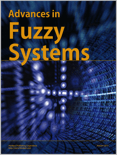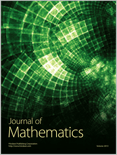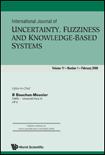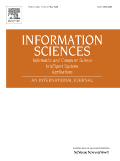
Advances in Fuzzy Systems
Scope & Guideline
Transforming Mathematics and Engineering with Fuzzy Logic
Introduction
Aims and Scopes
- Fuzzy Logic and Systems:
Core research on the principles, methodologies, and applications of fuzzy logic, including its integration into various computational models and systems. - Applications in Decision Making:
Exploration of fuzzy logic applications in decision-making processes across diverse fields, including healthcare, finance, and engineering. - Fuzzy Mathematics:
Research on advanced mathematical concepts related to fuzzy sets, fuzzy numbers, and their properties, contributing to the theoretical foundations of fuzzy systems. - Hybrid Models:
Development and application of hybrid models that combine fuzzy logic with other computational techniques, such as machine learning and optimization methods. - Fuzzy Control Systems:
Investigation of fuzzy control methodologies in engineering and technology, emphasizing their effectiveness in managing complex systems.
Trending and Emerging
- Healthcare Applications:
Recent papers highlight the application of fuzzy systems in healthcare, particularly in diagnostic models and patient management systems, reflecting a growing interest in leveraging fuzzy logic for improving health outcomes. - Machine Learning Integration:
The integration of fuzzy logic with machine learning techniques is a prominent trend, with increasing research on hybrid models that enhance predictive capabilities and decision-making processes. - Environmental and Resource Management:
Emerging research on fuzzy systems for environmental applications, such as water security and resource management, indicates a rising awareness of the need for sustainable practices. - Complex Decision-Making Problems:
There is a growing focus on using fuzzy logic to address complex decision-making problems in various sectors, showcasing its versatility and effectiveness in managing uncertainty. - Advanced Mathematical Techniques:
The journal has seen an increase in studies applying advanced mathematical techniques to fuzzy systems, such as fractional calculus and stochastic methods, indicating a trend towards more sophisticated theoretical frameworks.
Declining or Waning
- Traditional Fuzzy Set Applications:
There is a noticeable decline in papers focusing solely on traditional applications of fuzzy sets without integration into hybrid models or advanced computational techniques. - Basic Fuzzy Theory:
Research centered on fundamental fuzzy theory concepts, such as basic fuzzy set operations, has become less frequent, indicating a shift towards more complex applications and methodologies. - Fuzzy Applications in Non-Computational Fields:
There is a waning interest in applying fuzzy logic to non-computational fields, such as social sciences or humanities, as the journal leans more towards computational and engineering applications.
Similar Journals

International Journal of Fuzzy Systems
Transforming Complexity into Clarity through Fuzzy LogicThe International Journal of Fuzzy Systems, published by SPRINGER HEIDELBERG, is a premier platform for disseminating cutting-edge research in the fields of Artificial Intelligence, Control and Systems Engineering, Computational Theory and Mathematics, and more. With an impressive impact factor reflected in its Q2 category rankings across various domains, this journal serves as a vital resource for researchers, professionals, and students eager to explore the applications of fuzzy logic in solving complex real-world problems. Established in 2004, the journal continues to contribute significantly to theoretical advancements and practical implementations in areas such as information systems and software engineering. The journal does not offer Open Access, ensuring a curated audience of engaged readers and contributors. Its rigorous peer-review process guarantees high-quality publications that resonate within the scientific community. For those interested in the intersection of theoretical insights and practical applications, the International Journal of Fuzzy Systems stands out as an essential venue for knowledge exchange and innovation.

Granular Computing
Pioneering Research at the Intersection of Computing and IntelligenceGranular Computing, published by SpringerNature, is a premier academic journal dedicated to the interdisciplinary field of granular computing, a vital area of research that intersects with Artificial Intelligence, Computer Science Applications, and Information Systems. With an impressive impact factor indicating its prominence, Granular Computing holds a distinguished Q1 ranking in all three categories as of 2023, making it a critical resource for researchers and practitioners seeking to advance their understanding and applications in these rapidly evolving domains. The journal, based in Switzerland, offers a platform for innovative research, thorough reviews, and discussions that push the boundaries of conventional computing paradigms. Aimed at fostering collaboration and knowledge exchange among academics and industry professionals, it continuously publishes cutting-edge findings and theoretical advancements from 2016 through 2024. Although it operates under a hybrid access model, the significance of its contributions is illuminative for anyone aiming to keep abreast of developments in granular computing and its applications.

Facta Universitatis-Series Mathematics and Informatics
Inspiring Excellence: A Platform for Transformative ResearchFacta Universitatis-Series Mathematics and Informatics is a prestigious interdisciplinary journal published by UNIV NIS that emphasizes the integration of mathematical theories and computational methods essential for advancements in various scientific fields. With the ISSN 0352-9665 and E-ISSN 2406-047X, this journal serves as a vital platform for researchers and professionals to disseminate cutting-edge findings related to mathematics and informatics. As an open-access journal, it aims to enhance the visibility and accessibility of high-quality research, fostering collaboration among scholars globally. The journal's commitment to excellence is evident in its rigorous peer-review process, which ensures that only the most impactful and innovative research papers are published. Set against the backdrop of its esteemed Serbian institution, Facta Universitatis not only aims to contribute to the global academic discourse but also to inspire the next generation of mathematicians and computer scientists. As the field continues to evolve, this journal plays a crucial role in shaping the future landscape of mathematics and informatics.

Journal of Mathematics
Advancing mathematical frontiers through open access.Welcome to the Journal of Mathematics, a premier open access journal published by Hindawi Ltd, dedicated to advancing knowledge in the diverse realm of mathematics. Since its inception in 2013, the journal has provided a platform for the dissemination of significant mathematical research and applications, achieving recognition in the 80th percentile of the general mathematics category as per Scopus rankings. With a commitment to fostering academic collaboration and accessibility, the journal promotes critical dialogue among researchers, professionals, and students alike. Located in the vibrant academic hub of London, England, the Journal of Mathematics continues to enhance its impact within the mathematical community, as evidenced by its Q3 classification in mathematics (miscellaneous) for 2023. Join us in exploring groundbreaking research and innovations, as we converge towards the future of mathematical sciences through our open access model.

JOURNAL OF MULTIPLE-VALUED LOGIC AND SOFT COMPUTING
Advancing Logic, Empowering Computation.Journal of Multiple-Valued Logic and Soft Computing, published by Old City Publishing Inc, is a dedicated forum for advancing the fields of logic and soft computing. Since its inception in 2003, this journal has positioned itself as a valuable resource for researchers, professionals, and students interested in the complex interplay between multiple-valued logic systems and computational methodologies. With a broader reach into theoretical computer science, the journal is categorized in the Q4 quartiles across key areas, showcasing its role in disseminating relevant research despite its current position. This peer-reviewed publication silos essential discussions and breakthroughs that serve as a foundation for ongoing innovation in logic and computing theories. Though not currently open access, the journal continues to attract critical contributions that underscore its commitment to advancing knowledge in mathematical logic and software development through its effective symposium-like format, promoting collaboration among various stakeholders in the scientific community.

Mathematical Foundations of Computing
Bridging Mathematics and Computing for a Digital TomorrowMathematical Foundations of Computing, published by the American Institute of Mathematical Sciences (AIMS), is a distinguished open-access journal that has been actively disseminating influential research in the fields of Artificial Intelligence, Computational Mathematics, Computational Theory and Mathematics, and Theoretical Computer Science since its inception in 2009. With its E-ISSN 2577-8838, this journal is committed to providing researchers and practitioners with cutting-edge mathematical theories and methodologies that underpin modern computational practices, which is critical for advancing the field. The journal proudly holds a Q3 categorization in several relevant domains as of 2023, reflecting its contribution and accessibility amid an evolving academic landscape. By offering open access to its content, it ensures that vital research is freely available to a global audience, enhancing collaboration and innovation. Positioned in the heart of the United States, Mathematical Foundations of Computing serves as a crucial resource for advancing knowledge and fostering discussions among researchers, professionals, and students passionate about the mathematical underpinnings of computing.

Complex & Intelligent Systems
Elevating Multidisciplinary Research to New HeightsComplex & Intelligent Systems, published by SPRINGER HEIDELBERG, stands at the forefront of multidisciplinary research, focusing on the convergence of Artificial Intelligence, Computational Mathematics, and Engineering. With its rigorous peer-review process and impressive recognition within the academic community, this journal proudly holds a Q1 ranking in its respective categories for 2023, including a remarkable rank of #7 in Computational Mathematics out of 189 journals. Since transitioning to Open Access in 2015, Complex & Intelligent Systems has fostered accessibility and visibility for groundbreaking research, allowing professionals, students, and scholars worldwide to engage with high-impact studies. Hosted in the vibrant academic landscape of Switzerland, it not only enriches the scientific dialogue but also encourages innovative approaches to complex system analyses and intelligent solutions. With an unwavering commitment to advancing knowledge in evolving fields, this journal invites contributions that push the boundaries of research and application.

Fuzzy Information and Engineering
Innovating Solutions through Fuzzy Information and Applied MathematicsFuzzy Information and Engineering is a prestigious open access journal recognized for its contributions to the interdisciplinary fields of applied mathematics, control systems engineering, artificial intelligence, and information systems, published by TSINGHUA UNIVERSITY PRESS. With an impact factor that reflects its increasing influence, the journal has maintained a strong position in the academic community since its inception in 2011, converging its focus between 2014 and 2024. The journal is indexed in notable databases such as Scopus, demonstrating solid rankings across its categories, including a commendable Q3 classification in applied mathematics and control systems engineering. By fostering innovative research and disseminating key findings, Fuzzy Information and Engineering serves as a vital platform for researchers, professionals, and students alike, promoting advancements in fuzzy systems and their applications within diverse domains. Notably, since transitioning to an open access model in 2015, the journal has enhanced accessibility for a global audience, encouraging collaborative efforts in academia and industry.

INTERNATIONAL JOURNAL OF UNCERTAINTY FUZZINESS AND KNOWLEDGE-BASED SYSTEMS
Exploring the intersection of fuzziness and artificial intelligence.Welcome to the INTERNATIONAL JOURNAL OF UNCERTAINTY FUZZINESS AND KNOWLEDGE-BASED SYSTEMS, a prestigious publication dedicated to advancing the fields of artificial intelligence, control systems engineering, information systems, and software research. Published by WORLD SCIENTIFIC PUBL CO PTE LTD in Singapore, this journal serves as a vital forum for the dissemination of innovative theories, methodologies, and applications rooted in the coexistence of uncertainty and fuzziness within knowledge-based systems. With its ISSN 0218-4885 and E-ISSN 1793-6411, the journal consistently ranks in the Q3 category across various Scopus categories, including Control and Systems Engineering and Information Systems, reflecting its influential position in the academic community. Researchers and practitioners alike will find valuable insights and the latest trends through its comprehensive articles, making this journal an essential resource for those seeking to navigate the complexities of this evolving field.

INFORMATION SCIENCES
Leading the Charge in Information ResearchINFORMATION SCIENCES, published by Elsevier Science Inc, is a premier peer-reviewed journal that has become instrumental in advancing the field of information science since its inception in 1968. With an impressive array of quartile rankings in 2023, including Q1 in Artificial Intelligence, Computer Science Applications, Control and Systems Engineering, Information Systems and Management, Software, and Theoretical Computer Science, this journal serves as a vital resource for researchers and professionals looking to explore cutting-edge theories and practical applications within these domains. The journal is indexed extensively, with notable Scopus rankings, reflecting its significance and influence in the academic community—ranked 6th in Theoretical Computer Science and 10th in Information Systems and Management, among others. Although it does not currently offer an open-access option, the depth of research published within INFORMATION SCIENCES ensures that it remains a key reference point for advancing academic inquiry and addressing complex challenges in the information landscape.